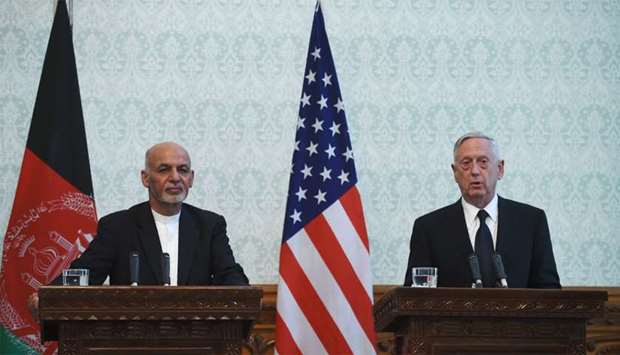* Attack underlines precarious security situation in Kabul
* Mattis urges Taliban to seek negotiated settlement
* Sought India's support for new S. Asia security plan
US Defense Secretary Jim Mattis visited Kabul on Wednesday to pledge support for the government of President Ashraf Ghani, with the precarious security in the Afghan capital underlined by an attack on the airport hours after he touched down.
Arriving from India, where he sought support for the US administration's new South Asia security plan, Mattis said the United States was determined not to allow ‘a merciless enemy to kill its way to power’.
Promising a more ‘holistic’ approach without fixed timetables and involving other countries in the region, including Pakistan, he said the Taliban would have to learn they could not defeat the government.
‘I want to reinforce to the Taliban that the only path to peace and political legitimacy for them is through a negotiated settlement,’ Mattis told a joint news conference with Ghani and NATO Secretary General Jens Stoltenberg.
Standing alongside him, Ghani said his government ‘remains open to talks with the Taliban’ as well as a peace strategy involving Pakistan.
‘Whatever sacrifice it requires to bring enduring peace and security to this country, we'll be committed to it,’ he said.
The visit comes after US President Donald Trump announced a new strategy for Afghanistan, promising a stepped-up military campaign against the Taliban who have gained ground as they seek to re-establish after their 2001 defeat.
But a rocket attack on Kabul airport that wounded several civilians and was claimed by both Islamic State and Taliban insurgents highlighted the insurgents' ability to strike the Western-backed government.
Fighters holed up in a nearby building continued to resist security forces, the interior ministry said, and sporadic gunfire and explosions could be heard from the vicinity of the airport for hours afterwards.
One security official, who spoke on condition of anonymity because he was not authorized to talk to the press, said three attackers were killed and 13 civilians wounded.
Mattis condemned the attack as a ‘criminal act by terrorists’, adding that it was a ‘classic definition of what the Taliban are up to here now’.
CIVILIAN CASUALTIES
As part of the new strategy, which will give US commanders greater freedom to use American firepower against the Taliban, Mattis has said the United States will send an additional 3,000 troops to help train Afghan security forces, which are focusing on building up the air force and special forces.
The strategy will also make greater use of US air power to support Afghan forces and strike the Taliban, a strategy that carries the risk of an increase in civilian casualties. Mattis declined to provide details of the plan.
‘I don't want to tell the enemy exactly what we are doing but the whole point is to make certain we have a compelling battlefield advantage over anything the Taliban tries to mass against your forces,’ he said.
United Nations figures from July showed a 43 percent jump in civilian casualties caused by an increase in air strikes in the first half of the year.
Mattis said US forces would do ‘everything humanly possible’ to limit the civilian casualties that fueled bitter disputes between Washington and the government of former president Hamid Karzai.
The Taliban have made steady inroads since NATO ended its main combat operation in 2014 and are now estimated to control or contest at least 40 percent of the country, and Afghan commanders have regularly pleaded for more air support.
There are now about 8,400 US troops in Afghanistan as part of the 13,500-strong NATO-led Resolute Support mission advising and training Afghan forces as well as a separate counter-terrorism mission, targeting Islamic State and al Qaeda.
Trump has said he expects NATO allies to increase contributions of both troops and funding to the Afghanistan mission, and Stoltenberg said the credibility of the international alliance depended on maintaining support.
‘We know the cost of staying in Afghanistan,’ he said. ‘But the cost of leaving would be higher. If NATO forces leave too soon, there is a risk Afghanistan may return to a state of chaos and once again become a safe haven for international terrorism.’

